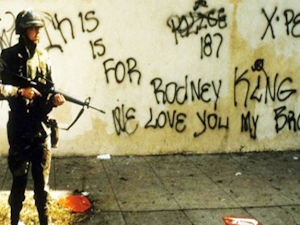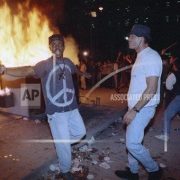Scholars Still Sorting Through Aftermath of L.A. Uprising
by Lydia Lum (Diverse Issues in Higher Education)
With his camcorder in tow, Dr. Darnell Hunt began exploring Los Angeles soon after mass unrest began on .
The uprisings by frustrated Angelenos followed the acquittals earlier that day in the trial of four L.A. police officers on charges of use of excessive force in the arrest and beating of unarmed, Black motorist Rodney King during a traffic stop that was caught on amateur video.
 Hunt, a University of California, Los Angeles doctoral student at the time, often felt dismayed whenever he came upon newspaper and TV reporters conducting outdoor interviews. However, Hunt was not surprised, either, that day after day, night after night, so many journalists focused on the arson fires and street violence without delving into the festering, decades-old root causes of the disturbances.
Hunt, a University of California, Los Angeles doctoral student at the time, often felt dismayed whenever he came upon newspaper and TV reporters conducting outdoor interviews. However, Hunt was not surprised, either, that day after day, night after night, so many journalists focused on the arson fires and street violence without delving into the festering, decades-old root causes of the disturbances.
“Plenty of people were trying to tell stories to reporters who ended up telling a different story on the air and in newspapers,” Hunt recalls. “Certain media frames controlled the narrative in 1992. Reporters fixated on the crime frame and the breaking news format. They ignored what many people were saying during interviews because it didn’t easily fit into the crime frame and the preferred narrative.”
The disconnect between news reports and what minority residents were trying to convey at that time caused Hunt to dig deeper during subsequent months and years to determine what the unrest meant to different racial groups. It is also why he has, over the years, participated in symposia that examine the landmark events of 1992 alongside contemporary analyses.
“It’s easy to revise and reframe history that ends up obfuscating linkages between the present and the past,” he says. “The more things change, the more they stay the same. We shouldn’t reduce the events of 1992 to just what happened to Rodney King, or we miss the bigger lessons. With every milestone involving 1992, it’s another chance to take a bite at the apple, so I always look forward to participating in these discussions.”
Three university-sponsored symposiums in Southern California this week feature many scholars such as Hunt, who is now a UCLA sociology professor and director of UCLA’s Ralph J. Bunche Center for African American Studies. The three conferences coincide with the 25th anniversary of the 1992 uprisings in L.A.
To read the full article, click here.

